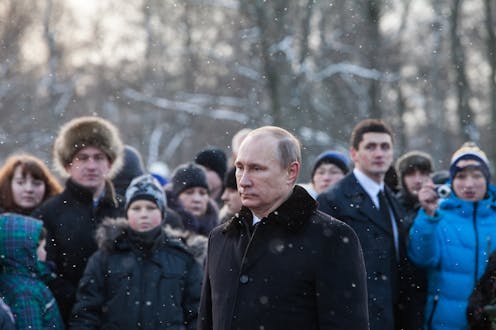
Ruscism, also known as rashism, russism or simply Russian fascism, is the ideology that forms the backbone of Vladimir Putin’s decades-long dictatorial rule. The term was coined by journalists to describe Russian ultranationalism in Chechnya and Georgia in the late 1990s. However, it began to crystallise into a fully-fledged ideology, complete with an omnipresent symbol – the Latin letter Z – after Russia’s invasion of Ukraine in February 2022.
Ruscist ideology undoubtedly has deep fascist roots. Its foundations were laid by Russian political ultranationalist thinker Ivan Ilyin (1883–1954), whose work Putin has frequently referenced in speeches. More recently, Putin has been inspired by the works of modern far-right thinkers Alexander Dugin and Timofey Sergeytsev. The latter published an article in April 2022 calling for the total destruction of the Ukrainian state and its national identity.
Ruscism, like other forms of fascism, upholds an ultranationalist and dictatorial political system with a strong supreme leader who demands complete obedience from citizens (including all those living in Russian speaking territories).
It does, however, have some distinguishing characteristics with regard to other far-right ideologies. These include a total disregard for objective reality and a strong focus on Russia’s role in world history.
Putin’s principles for governing are very clear, and we have identified six here that define his domestic and international politics.
1. Russia won World War II
Ruscism leans heavily on history. According to the propaganda disseminated by Putin and his followers, Russia (then the USSR) won the second world war single-handed. This victory gives Russia a special, perpetual pass for any sins it may commit.
This means that failures such as the Cold War, the Soviet fiasco in Afghanistan, and the brutal, ongoing Russian invasion of Ukraine that began in February 2022 – along with any complications they cause – are irrelevant. What really matters to Putin is that Russia defeated Nazism. For this reason, Putin makes constant references to WWII and the anti-Hitler coalition in his speeches. Indeed, the initial justification given for Russia’s invasion of Ukraine was to liberate and “denazify” the country.
2. Russia is a global superpower
Putin argues that the dissolution of the Soviet Union was the biggest geopolitical catastrophe of the 20th century, and his mission is to restore Russia to its former glory.
To achieve this goal, Putin believes that Russia must demonstrate its military power and demand the respect of the international community. Therefore, the invasions of Georgia and Ukraine, as well as its involvement in Syria, are not isolated incidents, but rather a pattern of deliberate, aggressive political strategy.
3. Russia is a nuclear superpower
The Russian President has implied or openly stated on several occasions that the West must take Russia’s nuclear capabilities into consideration. He has also dropped out of international agreements to control nuclear weapons, and has stationed nuclear missiles in neighbouring ally Belarus.
He believes Russia’s nuclear arsenal will prevent any country from ever daring to directly attack it, and frequently reminds the world of this.
4. Dissent must be crushed
Anyone who opposes Putin is to be tightly controlled, regularly harassed, imprisoned, and, if need be, physically eliminated. The foremost example of this is the lawyer, opposition leader and activist Alexei Navalny, who has been repeatedly imprisoned on spurious charges, and even poisoned with nerve agent novichok.
A lot of other domestic opposition to Putin – such as the communist leader Gennady Zyuganov and, more recently, the populist nationalist Vladimir Zhirinovsky – seems to present little threat to his indefinite rule.
5. Support pro-Russian dictators
By supporting pro-Russian dictators, such as Bashar al-Assad in Syria or Aleksandr Lukashenko in Belarus, Russia can demonstrate its political relevance to the West. It also indicates loyalty to Russian allies, who can count on Russia regardless of their crimes and policies.
Most of Russia’s allies are not democracies. In fact, Russia has recently made a commitment to strengthening ties with North Korea, a country widely regarded as having one of the worst human rights records on the planet. Supporting countries such as these points to a more classically Fascist element of Putin’s ideology: he wants the world to know that democracy is not the only feasible governing model.
6. Blame the West
According to Russian propaganda, the West is the only responsible party for the Russian invasion of Ukraine.
Americans seem to be the most useful, universal scapegoat. They are blamed for Ukraine seeking membership of the EU & NATO, and Russian news sources have even gone as far as holding the US accountable for bad weather.
By portraying the West, in its entirety, as an enemy to Russian interests, Putin provides himself with a limitless supply of arguments and justifications for Russia’s continued aggression and invasions.
Attempts to question Russia’s motivations are often met with defensive retorts against Western powers. These have included questioning NATO’s actions in Serbia and Kosovo and highlighting American settler violence against Native Americans.
Fascism takes root
Ruscism is now, to all intents and purposes, the Russian state ideology. It existed before the current war in Ukraine, but the conflict has catalysed its spread in institutions, and the population at large. Though it is a complex system that builds on centuries of global conflict, its aim is clear: one ideology, one leader, one state, one nation.
Christo Atanasov Kostov does not work for, consult, own shares in or receive funding from any company or organization that would benefit from this article, and has disclosed no relevant affiliations beyond their academic appointment.
This article was originally published on The Conversation. Read the original article.







